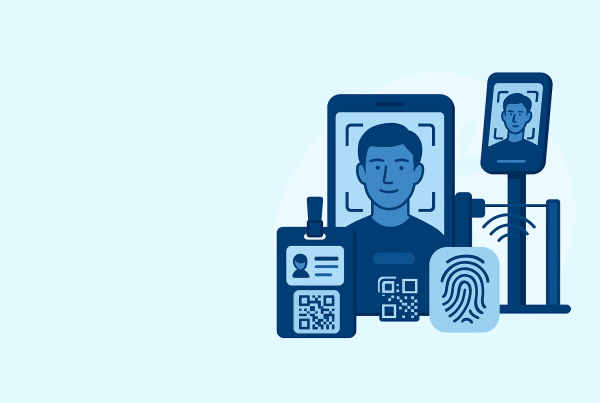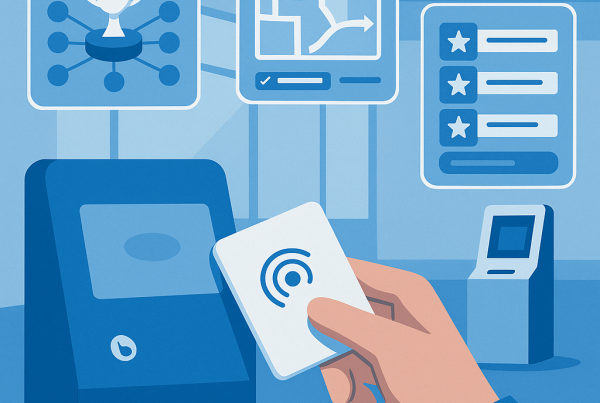With the constant development of new features and consequent power of choice, it’s more challenging to make decisions on what to choose to fit the need to organize successful events.
Technology, in general, is constantly evolving and will probably never stop. We have lost track of how far we’ve come and how our lives have changed because of technological innovations.
This article will help you make the best decisions if you’re not already familiar with the new technology trends in the event industry so you can easily reach your main event KPIs and goals: boost registration or ticketing, boost engagement rate, return on investment (ROI), part of 7 crucial KPIs to measure your event success.
Main trends & challenges for the future of events
Safety and security concerns
One challenge that will be part of the future because of technological developments, particularly with the growth of virtual and hybrid events, is building a good defense against hackers and cyber-attacks.
As an event organizer, you need to rely on a platform that provides you with the necessary security, especially if you’re dealing with some form of payment or sharing of sensitive data.
Virtual reality events
We’re moving more and more towards a new world, a parallel world. Although virtual events are already a trend, it’s expected that there will be a transition to virtual reality events.
Virtual reality allows us to live a new “reality” through an avatar, where we can have an event experience closer to reality. This will make the whole event experience more immersive. Event organizers who take advantage of this early technology will certainly have a competitive advantage in the industry.
Events mobile app
Mobile applications are transforming the attendee experience because they allow easy information distribution and are also eco-friendly (a characteristic that’s increasingly demanded in all types of consumption).
By providing a mobile application, you can constantly share information about your event, from information about sessions, speakers, and exhibitors. All of this can be part of a strategy to drive attendees to the event, through push notifications.
The result is the constant reminder that the event is approaching and the consequent adherence to it.
Events big data
Data is increasingly necessary to make decisions towards successful events because it allows you to gain valuable insights. Something absolutely necessary for continuous improvement.
To extract data about your event, you need to analyze all kinds of interactions and behaviors that attendees perform while connecting with other participants. And there’s nothing better for that than offering contactless technologies. First, because it makes the whole data collection process easier, and second because it increases the likelihood of attendee engagement at the event.
What are some examples of event technologies?
All-in-one events management platform
Choosing the right event management software allows you to have all the tools you need to plan your event autonomously. With integrated tools for both digital and in-person events, you’ll have the opportunity to benefit from features centralization, making event management easier than ever.
Contactless & wearable events technology
Contactless technology solutions for events will eventually become a mandatory requirement for event organizers because paper is becoming obsolete. This will happen because paper doesn’t have the capability of speeding up the check-in and interaction processes and also because sustainable events have contactless & paperless interactions.
The most common contactless technologies nowadays are QR codes, and smart badges,
Learn more about beamian contactless solutions for in-person events.
A more recent contactless technology is facial recognition, where attendees scan their faces to gain access to the event. This might be useful if you have multiple devices with the ability to identify your attendee’s throughout the event and figuring out their behavior.
Events layout software
An event layout software or, in other words, event diagramming software is becoming increasingly important to have a detailed picture of your event layout. Lighting, foot traffic, and any other element that will be placed in the venue will have an impact on your attendee’s experience.
This won’t only be valuable so you can optimize the experience of your attendees but also where you will place each exhibitor, depending on how much you want to highlight them.
How technology can improve the attendee and exhibitor experience
Let’s now take a look at how technology can improve the attendee and exhibitor experience based on contactless technology and its capability to gather data.
Not only has contactless technology made the work of event organizers easier but is also reflected positively in the satisfaction of attendees and exhibitors by eliminating long queues and providing a more immersive experience when it comes to interactions.
For in-person events, for example, participants can have their personal information on a smart badge and can easily share their contact by approaching a device, such as a beamer – a lead capture technology provided by beamian.
When it comes to virtual events, visitors can also go to the exhibitors’ stands and leave their contacts or manifest interest in a product within the event management platform. From here, exhibitors can gather leads or crucial information when it comes to the decision-making of their portfolio.
In addition to this, it’s also possible to have a chat with the exhibitor contributing to a more direct relationship between event participants.
Using the right tools and features to achieve your event goals (must-haves)
Digital registration & easy event check-in
Digital registration makes everything effortless and adaptable since participants can register from anywhere with any device with an internet connection. It’s also a way to build up customizable forms to extract the information that you need.
If your goal is to speed up the check-in process so that it doesn’t result in attendee dissatisfaction, use a contactless event check-in solution, as this allows you to greet each visitor within 2 seconds.
Event ticketing
If you’re hosting a paid event, you need a reliable ticketing system. Make sure this ticketing system includes the possibility to create different types of tickets if needed.
Through different tickets, you can give different event experiences. For example, you democratize your event by selling lower-priced tickets with a more limited experience or the possibility to live a premium experience by selling VIP tickets at higher prices.
Promo codes are also a great future when it comes to event ticketing. You might want to apply discounts to visitors who buy the ticket earlier, or you can even create invisible tickets activated by a specific code to invite your special guests.
Add-ons are also an added value, for example, to multi-day conferences, where it is often necessary not only for attendees to buy a ticket but also to look for accommodation. Take advantage of this opportunity to establish new partnerships and increase the profitability of your event.
Exhibitors’ highlight
It’s expected that exhibitors attending in-person events will want to have the best venue location to raise the likelihood of having more interactions with attendees. This often involves having their stand in locations where there’s more probability to have more traffic.
On the other hand, you have virtual events where attendees can’t walk around the venue, but rather explore the virtual event platform in which the event takes place. For this reason, there’s a feature that highlights exhibitors by tiers, giving them different levels of brand exposure at the event.
Product showcasing
The value of the global eCommerce market is estimated to be worth 5.55 trillion by 2022 and is expected to continue to grow in the coming years. This brings you an opportunity to combine the best of what events have to offer. Raise brand awareness and build a human relationship with your visitors, and showcase your products in a customizable way so you can increase the probability to drive sales.
Learn more about the 10 must-have event management features.
How technology can help reduce safety and data security concerns
As an event organizer, it should be one of your main concerns to keep your visitor’s and exhibitors’ data as safe as possible because data breaches can cause serious harm to your business and even take you off the market.
Here are some solutions to mitigate these concerns:
- Encrypt your valuable data and create backups;
- Train your employees to look out for phishing emails;
- System and software updated to protect against security breaches;
- Multi-factor authentication
- Different permissions for your team on the event management platform
As you can see, technology is not only evolving and changing the way we live our daily lives but is also spreading to the events industry, changing the way they are organized by event managers and experienced by exhibitors and attendees.
Being constantly aware of new technological innovations and applying them to your events, could be the difference between your success or failure. Of course, not everything is positive. As technologies evolve, so do methods of cybercrime, so be cautious.
With this in mind, now is the time to offer an even better event experience with the help of technology while also protecting the data of your exhibitors and visitors.








